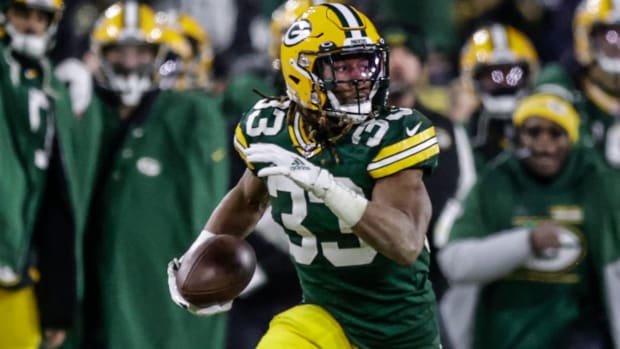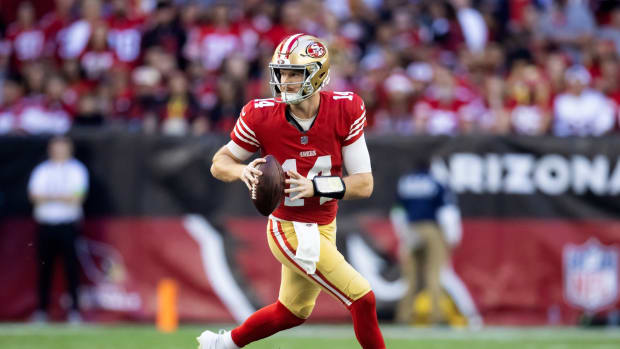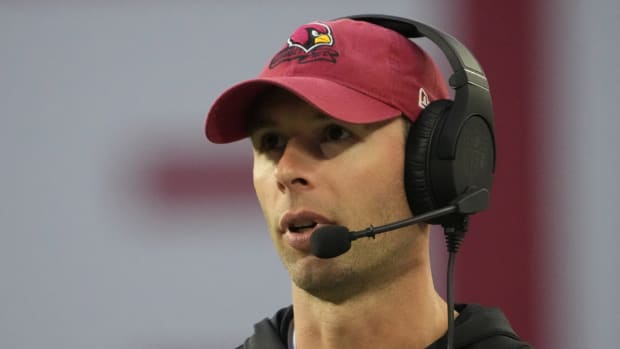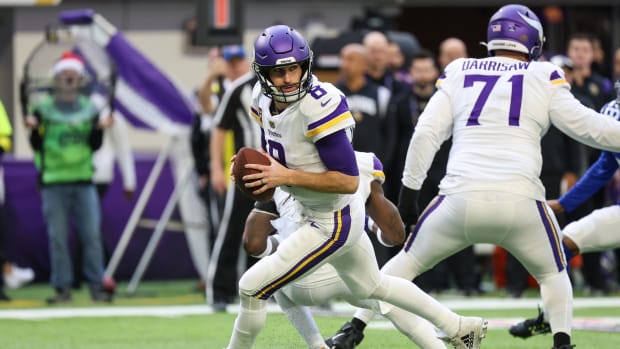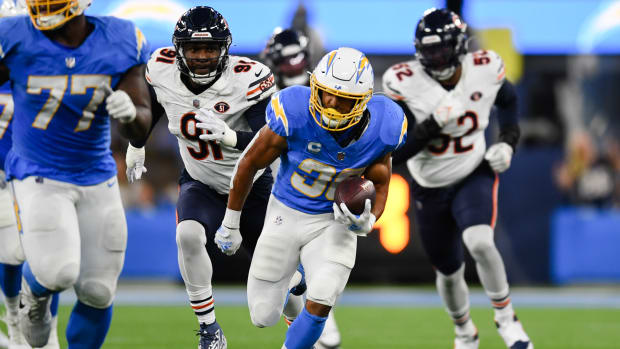Retired players who opt out of NFL concussion settlement taking big risk
U.S. District Judge Anita Brody is expected to soon give final approval to the proposed concussion injuries settlement between the NFL and approximately 25,000 retired players and 9,000 relatives of deceased players. Last year Brody preliminarily approved the settlement, which will require the NFL to spend about $765 million on improved care and neurological testing for retired players. Settlement funds are designed to be available for at least 65 years and could require additional funding by the NFL.
• Complete Deflategate coverage | Super Bowl XLIX: News, features
Analyzing the legal ramifications of Bill Belichick's Deflategate comments
While more than 99 percent of players and families in the class action remain parties to the proposed settlement, approximately 220 retired players and families have opted out. Their reasons vary, but a leading rationale is that many retired players with serious health problems will not qualify for settlement benefits or will receive much less than they need. Chronic traumatic encephalopathy (CTE) is thought to be the health problem most underserved by the proposed settlement. The Boston University CTE Center defines CTE as "a progressive degenerative disease of the brain found in athletes (and others) with a history of repetitive brain trauma, including symptomatic concussions as well as asymptomatic subconcussive hits to the head."
Those with CTE tend to exhibit heightened levels of aggression and depression, among other afflictions. Dozens of retired NFL players, including Junior Seau and Jovan Belcher, reportedly had CTE found in their brains after their deaths. Current technology doesn’t allow for CTE to be diagnosed during someone’s lifetime, although CTE symptoms are detectable.
• KING: Super Bowl ref Bill Vinovich's remarkable comeback story
By opting out, players and families can pursue their own lawsuits against the NFL and revisit legal arguments originally raised by the first set of NFL concussion lawsuits in 2011. The NFL, according to retired players who have sued the league, failed to adequately warn players about the long-term health risks of concussions and other head injuries, failed to protect players who were injured during games and sponsored biased studies on football's neurological health risks. The strategy of suing individually is a bold one that does not come without plenty of risk.
Advantages of opting out and filing individual lawsuits against NFL
Texans owner on concussion case: 'It was about protecting the brand'
The main upside is the possibility that the NFL will eventually be forced to provide more substantial compensation and greater healthcare benefits than it would be compelled to by the proposed settlement. Faced with another round of litigation that reflects poorly on the league, the NFL might offer improved settlement terms as a way of inducing the players to drop their new lawsuits. Or, should these lawsuits go to trial and juries hold the NFL liable, the potential damages assessed by jurors could be massive and far eclipse settlement payments.
The prospect of increased money and improved care isn’t the only attraction to the retired players and families who have opted out. From a moral perspective, many of them want to see the NFL held accountable by law for the concussion crisis in football. A settlement may not provide the sense of justice sought by retired players and their families who want their day in court.
Potentially devastating risks of opting out
While there is potential upside in opting out, the risks are enormous. There is a considerable chance, in fact, that retired players and families who opt out of the proposed settlement and pursue their own lawsuits will end up with nothing.
Implications of an NFL investigation into Patriots' Deflategate
The first danger is that new lawsuits would face a powerful preemption defense by the NFL. The NFL would contend that, per collective bargaining agreements signed by the NFL and NFLPA, grievances over player health issues must be brought through arbitration, not litigation. This is likely true even for players who played between 1987 and 1992, a period when there was no official collective bargaining agreement in place. Courts are usually unwilling to alter grievance procedures found in collective bargaining agreements, and sports leagues enjoy a high rate of success when employing the preemption defense. In fact, early in the concussion litigation, the NFL succeeded on court motions that players' claims were preempted. This should concern players and families who have opted out of the settlement and plan to sue the NFL. If their claim is preempted, their lawsuit will be tossed out of court.
Having a lawsuit dismissed by a judge wouldn’t be the end of the world for retired players and families if they could then pursue arbitration against the NFL. The problem is they may have waited too long. In fact, there is a real possibility that a judge could dismiss concussion-related lawsuits as preempted, then an arbitrator could dismiss any grievances as untimely. Retired players and families would then be left with nowhere to turn.
Since the first NFL-NFLPA collective bargaining agreement was signed in 1968, players have been required to raise grievances in a timely manner pursuant to procedures detailed in the CBA. While the timeliness requirement has varied over the last 47 years, the general range in which grievances must be raised falls within 45 to 60 days after an injury was known or reasonably should have been known to a player. For years, the vast majority of retired players have known about both their injuries and the healthcare allegations against the NFL. This suggests their grievances would likely be time-barred. Along those lines, an arbitrator would probably raise questions as to why players didn’t discover their injuries and possible claims against the NFL after the first concussion lawsuit was filed in 2011.
Rashanda McCants, Devon Ramsay file suit against UNC, NCAA
A grievance being time-barred is not simply a theoretical concern for the players and families who have opted out of the proposed settlement. In the recent painkiller litigation against the NFL -- Richard Dent et al. v. NFL, which a federal judge dismissed last month -- the NFL filed as exhibits dismissals of arbitration grievances brought by players against the NFL over allegedly substandard medical care. Crucially, arbitrators had dismissed those grievances because they were filed too late pursuant to procedures detailed in the CBA. The NFL has successfully used the time-barred defense to defeat other arbitration claims. While concussion-related arbitrations might be treated differently, there is no obvious reason to believe so.
Even if players get to court or arbitration, the NFL would be prepared to combat their legal arguments. As they have since the first concussion lawsuit was filed in 2011, NFL attorneys would contend that the league did nothing wrong. The league has consistently rejected accusations that it failed to adequately warn players of dangers posed by concussions. The league insists that these allegations are not grounded in law.
Key issues in murder trial of former Patriots tight end Aaron Hernandez
To bolster its defense, the NFL would charge that there is a lack of sufficient causation between players’ health problems and any potential misconduct by the NFL. To be sure, it would be factually challenging for players to "prove" that their injuries occurred while playing in the NFL, as opposed to while playing football in college, high school or Pop Warner. Before a player’s first NFL practice, he has already participated in thousands of plays in games or practices. The NFL would insist that the causal link between playing in the NFL and long-term health problems is too speculative. Players could attempt to rebut the NFL’s defense on causation, highlighting data that shows retired NFL players have worse neurological health on average than do football players who never made it to the NFL or men in general. But causation would be a real hurdle in any concussion lawsuit.
Another legal barrier for retired players and families would be the concept of assumption of risk. The NFL could argue that players assumed the risk of brain and other injuries by playing in the NFL. In a sport where very large men collide at very fast speeds, over and over again, danger is self-evident. Players, however, would contend that the NFL obscured the specific dangers at issue in a lawsuit—namely, the long-term problems of head injuries. Still, assumption of risk would be a cloud over lawsuits against the NFL.
A legal Hail Mary
The bottom line is that players and families who have opted out of the proposed settlement are taking a big risk. While their gamble could prove successful, there are compelling legal reasons to be skeptical.
Players and families who have opted out of the proposed settlement can petition to be reinstated. But the window for reinstatement is shrinking; it will close when Judge Brody gives final approval. Only time will tell which legal strategy proves the wisest.
Michael McCann is a Massachusetts attorney and the founding director of the Sports and Entertainment Law Institute at the University of New Hampshire School of Law. He is also the distinguished visiting Hall of Fame Professor of Law at Mississippi College School of Law.
































